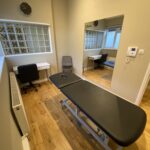Hi all,
For people into golf it’s great fun, good exercise (mainly the walking and seeing how far you can throw a club on a bad day!) and great for social interactions but when conditions like golfers elbow, back pain or shoulder injury holds you back what do you do??
Why is Golf Hard?
Golf is also difficult! There is a huge amount of info online to ‘help’. When you go onto Youtube and search for anything to do with golf technique be it; correct grip, through to ‘why do I keep hitting the ball into a hedge on the right side of the fairway??’ you get hundreds of videos sometimes with millions of views! I think one of the reasons why it’s so hard is because it’s one of the few sports that you hit a totally stationery ball. You have a lot of time to think about technique or as they’re known, ‘swing thoughts’ before you hit a shot, unlike tennis for example, where a ball is travelling at speed to you and you have almost zero time to think about correct technique. We’ve all been there whilst standing over the ball I am sure! ‘Are my feet in the right place?’, ‘is my club face aligned?’, ‘is the humidity in the air going to cause me to thin the **** out of this shot??’ etc etc. It’s hard!
Golf Related Injury
In the clinic in Cobham I see, as you can imagine a lot of golfers. Surrey has more golf courses per square mile than anywhere else in the world apparently. (That might be made up, but sounds impressive.) Injuries common to golfers range from; golfers elbow and tennis elbow, shoulder and rotator cuff injuries, back and neck pain, hip issues, big toe issues, the list really goes on and on! As the golf swing is such a dynamic movement, very asymetric and also starts, as mentioned from a relatively stationary position you can potentially over load any part of your body and cause injury.
How an Osteopath can help
Let me make this clear, I am not a golf pro, however I have a particular set of skills (a bit like Liam Neeson but minus the killing bit) that mean I can look at how someone moves in their swing and link it back to the area of your body that’s injured or in pain, understand from a detailed case history what factors may also be contributing to a break down in efficient movement, like an old injury or previous surgery. What can be very useful is feeding this info back to your golf pro if you’re in the process of getting lessons. This will hopefully help them with technique changes that may be different to the so called normal approach to a golf swing. Make sense? Good!
Dave’s Story
Dave, (not his actual name. Its’s David;) came to see me recently for low back pain. He plays a lot of golf to a decent standard but has really been struggling to even finish a round due to pain. On examination his upper back has so stiff and restricted in movement. When I then got him to demonstrate his swing to me he was having to rotate through his low back as he just couldn’t get the rotation to happen higher up where he needed it. A couple of sessions of treatment, some suggested upper back exercises and an email to his pro explaining this all equalled a significant improvement very quickly. Not complicated when you know what to look for but Dave couldn’t work it out on his own. Obviously I now take full credit for his recently reduced golf handicap!
I hope some of this waffle is of interest to someone and please do pass it on to anyone you know that plays and is struggling with injury or pain particulary if they’re getting lessons and finding it tricky to move in the way they may be getting told too. Thanks so much as always. x


